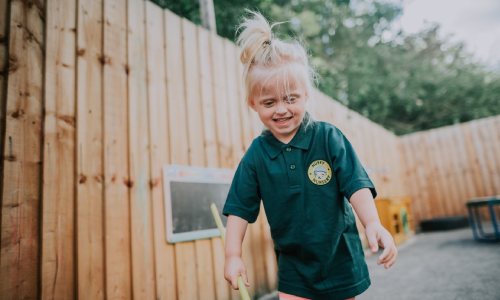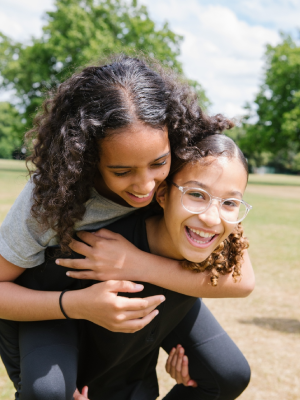Children’s mental health | 5 ways movement and exercise can help
- Overview
Whatever age your child is, physical activity is a great way to improve their overall mood and build positive relationships with others. Keep reading to learn how regular and moderate exercise can help your child improve their mood and develop better resilience to stress and worry.
1. Boosted mood
Children often appear happier and more content after they’ve been playing and running around. This is likely because physical activity stimulates the release of endorphins (feel-good chemicals) in the brain. Amongst other things, these endorphins help boost our mood.

Children of all ages can benefit from more movement. It’s proven to improve their overall mood and how they’re feeling. Whether that’s by going to a martial arts or dance class, or kicking a football around at lunchtime, moving the body will instruct the brain to release more of these feel-good hormones.
Exercise is also linked to better sleep quality in children of all ages. Getting a good night’s sleep is vital for fuelling all the physical and mental changes that happen when we’re young.
If your child isn’t sleeping properly, they might have difficulty concentrating or seem restless, fatigued, or agitated. Encouraging movement during the day can help burn excess energy so they drift off quicker and stay asleep for longer at night.
2. Build confidence and achievement
No matter what their age, setting and reaching goals gives your child a sense of achievement that will give them confidence in their own ability. It’s important to remember that some children find physical exercise easier than others. Try to set small achievable goals to build their confidence and belief that they can overcome the things they find intimidating or physically challenging.
From being a baby, children learn positive behaviour when their parents recognise and reward it. This means that as a parent, it’s important you praise your child’s effort and achievements, no matter how well they do or whether they’re successful or not.
Whether they’re taking their first steps or stepping out onto the pitch, feeling like they’ve achieved something will help boost a child’s self-esteem and belief going forward.
3. Develop essential social skills

Developing relationships with others can help reduce stress, anxiety, and worry throughout life.
For children, building friendships is vital for developing the essential social skills that they’ll carry into adolescence and adulthood. Failure to understand and practice these skills can result in increased anxiety and stress.
Movement is a great way to learn these cues and develop a unique understanding of how their mind interacts with their body. By playing games with other children at school and engaging in physical activity, children learn to communicate better and they develop their own voice and understanding of language.
Team sports also build confidence and improve a child’s ability to work with others. This is because sport is all about reading ques from teammates and learning how to respond and react quickly.
4. Release anger and frustration
Most children learn ways of dealing with uncomfortable feelings like anger and frustration as they age. If your child has anger problems or finds talking about their emotions difficult, it might be because they don’t know how or because they haven’t picked up the tools to do so yet.
Movement is a great way for young children to learn how to do this. They’ll burn energy, which gives them an outlet for frustration, and the release of endorphins that physical movement promotes will help offset feelings of anger and irritation.
Movement also helps kids learn all about themselves and how they react to certain outside stimuli and stressors. Running around and playing games in the playground is a great way to expose them to new and challenging emotions that they’ll learn to deal with over time.
As they get older, organised sport can help children understand how to deal with losing and disappointment. Whilst nobody wants their child to lose, exposing them to these emotions in a structured environment alongside their peers is a great way to promote healthy coping mechanisms for these common thoughts and feelings.
This can also help promote a healthy attitude towards competition, so your child learns to celebrate the achievements of others. There is also research to suggest that children who play sport regularly actually have fewer emotional and behavioural problems.
5. Build relationships with other children
Socialising helps kids build positive relationships with other children and develop their social skills, both of which contribute to better self-esteem, confidence, and emotional intelligence.
You’ll find that as your child ages and their interests change, the ways they use movement to socialise change too. Infants and toddlers love running around and letting off steam with each other at playgroup, whilst older children and teenagers tend to bond over shared sporting interests.
What’s important is that as your child ages, you continue to reinforce the social benefits of exercise and physical activity. Where possible, engage in activities with them whether that means going for walks or putting a basketball hoop on the side of the house and playing with them.
Keeping in contact with other parents and liaising about what your child and their friends are into is a great way to do this. Promoting exercise or sport as a social activity they can do with friends is a great way to make sure your child continues to enjoy and reap the social rewards from exercise as they grow.
Last updated Monday 22 April 2024
First published on Monday 22 April 2024

